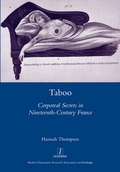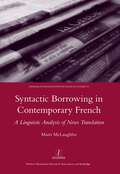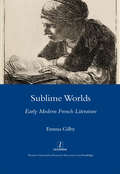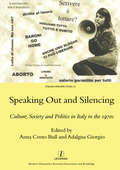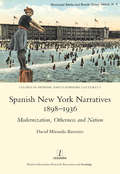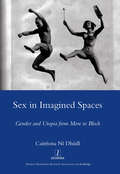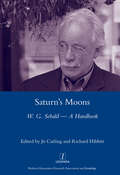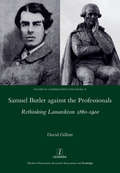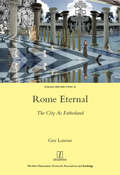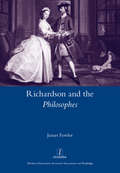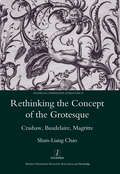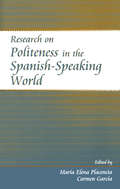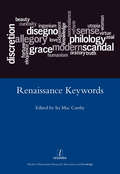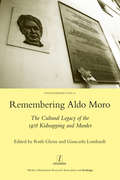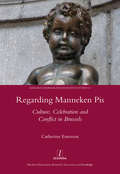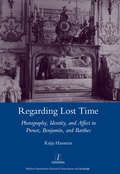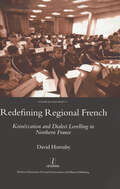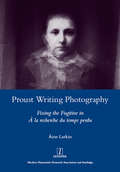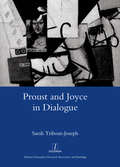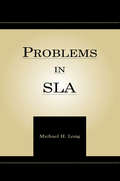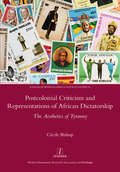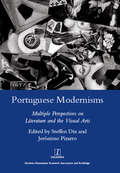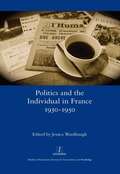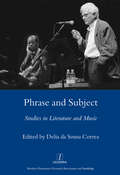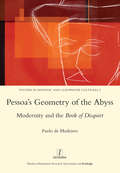- Table View
- List View
Taboo: Corporeal Secrets in Nineteenth-century France
by Hannah ThompsonFrench realist texts are driven by representations of the body and depend on corporeality to generate narrative intrigue. But anxieties around bodily representation undermine realist claims of objectivity and transparency. Aspects of bodily reality which threaten les bonnes moeurs - gender confusion, sexual appetite, disability, torture, murder, child abuse and disease - rarely occupy the foreground and are instead spurned or only partially alluded to by writers and critics. This wide-ranging study uses the notion of the taboo as a powerful means of interpreting representations of the body. The hidden bodies of realist texts reveal their secrets in unexpected ways. Thompson reads texts by Sand, Rachilde, Maupassant, Hugo, Barbey d'Aurevilly, Mirbeau and Zola alongside modern theorists of the body to show how the figure of the taboo plots an alternative model of author-reader relations based on the struggle to speak the unspeakable. Dr Hannah Thompson is a Senior Lecturer in French at Royal Holloway, University of London. Her first book, Naturalism Redressed: Identity and Clothing in the Novels of Emile Zola, was published by Legenda in 2004.
Syntactic Borrowing in Contemporary French: A Linguistic Analysis of News Translation
by Mairi MaLaughlinIt is widely held that the large-scale translation of international news from English will lead to changes in French syntax. For the first time this assumption is put to the test using extensive fieldwork carried out in an international news agency and a corpus of translated news agency dispatches. The linguistic analysis of three syntactic structures in the translations is complemented by an investigation of the effects of a range of factors including, most notably, the speed at which the translation is carried out. The analysis sheds new light on the ways in which news translation could lead to syntactic borrowing in French, and by extension, in other languages.
Sublime Worlds: Early Modern French Literature
by Emma GilbySome of the language we come across, in reading other peoples' works or listening to others speak, moves us profoundly. It requires a response from us; it occupies and involves us. Writers, always readers and listeners as well, are fascinated by this phenomenon, which became the subject of the classical treatise On the Sublime , traditionally attributed to Longinus. Emma Gilby looks at this compelling and complex text in relation to the work of three major seventeenth-century authors: Pierre Corneille, Blaise Pascal and Nicolas Boileau. She offers, in each case, intimate critical readings which spin out into broad interrogations about knowledge and experience in early modern French literature.
Speaking Out and Silencing: Culture, Society and Politics in Italy in the 1970s
by A. BullCommonly referred to collectively as the anni di piombo -- years of lead -- the 1970s have been seen as a parenthesis in Italian history, which was dominated by political violence and terrorism. The seventeen essays in this wide-ranging collection adopt different scholarly perspectives to challenge this monolithic view and uncover the complexity of the decade, exploring its many facets and re-assessing political conflict. The volume brings to the fore the ruptures of the period through an examination of literature, film, gender relations, party politics and political participation, social structures and identities. This more balanced assessment of the period allows the vibrancy and dynamism of new social and cultural movements to emerge. The long-lasting effects of this period on Italian culture and society and its crucial legacy to the present are lucidly revealed, dispelling the widely-held belief that the 1970s were largely a regressive decade. With the contributions: Anna Cento Bull, Adalgisa Giorgio -- The 1970s through the Looking GlassPiero Ignazi -- Italy in the 1970s between Self-Expression and OrganicismPaola Di Cori -- Listening and Silencing. Italian Feminists in the 1970s: Between autocoscienza and TerrorismAmalia Signorelli -- Women in Italy in the 1970sLesley Caldwell -- Is the Political Personal? Fathers and Sons in Bertolucci's Tragedia di un uomo ridicolo and Amelio's Colpire al cuoreJennifer Burns -- A Leaden Silence? Writers' Responses to the anni di piomboAdalgisa Giorgio -- From Little Girls to Bad Girls: Women's Writing and Experimentalism in the 1970s and 1990sEnrico Palandri -- The Difficulty of a Historical Perspective on the 1970sMark Donovan -- The Radicals: An Ambiguous Contribution to Political InnovationCarl Levy -- Intellectual Unemployment and Political Radicalism in Italy, 1968-1982Roberto Bartali -- The Red Brigades and the Moro Kidnapping: Secrets and LiesTom Behan -- Allende, Berlinguer, Pinochet... and Dario FoPhilip Cooke -- 'A riconquistare la rossa primavera' The Neo-Resistance of the 1970sClaudia Bernardi -- Collective Memory and Childhood Narratives: Rewriting the 1970s in the 1990sValeria Pizzini Gambetta -- Becoming Visible: Did the Emancipation of Women Reach the Sicilian Mafia?Davide PerO -- The Left and the Construction of Immigrants in 1970s ItalyAnna Cento Bull -- From the Centrality of the Working Class to its Demise: The Case of Bagnoli, Naples
Spanish New York Narratives 1898-1936: Modernization, Otherness and Nation
by David Miranda-BarreiroIn the early decades of the twentieth century, New York caught the attention of Spanish writers. Many of them visited the city and returned to tell their experience in the form of a literary text. That is the case of Pruebas de Nueva York (1927) by Jose Moreno Villa (1887-1955), El crisol de las razas (1929) by Teresa de Escoriaza (1891-1968), Anticipolis (1931) by Luis de Oteyza (1883-1961) and La ciudad automatica (1932) by Julio Camba (1882-1962). In tune with similar representations in other European works, the image of New York given in these texts reflects the tensions and anxieties generated by the modernisation embodied by the United States. These authors project onto New York their concerns and expectations about issues of class, gender and ethnicity that were debated at the time, in the context of the crisis of Spanish national identity triggered by the end of the empire in 1898.
Sex in Imagined Spaces: Gender and Utopia from More to Bloch
by Caitriona DhuillFrom Thomas More onwards, writers of utopias have constructed alternative models of society as a way of commenting critically on existing social orders. In the utopian alternative, the sex-gender system of the contemporary society may be either reproduced or radically re-organised. Reading utopian writing as a dialogue between reality and possibility, this study examines the relationship between historical sex-gender systems and those envisioned by utopian texts. Surveying a broad range of utopian writing from the nineteenth and twentieth centuries, including Huxley, Zamyatin, Wedekind, Hauptmann, and Charlotte Perkins Gilman, this book reveals the variety and complexity of approaches to re-arranging gender, and locates these 're-arrangements' within contemporary debates on sex and reproduction, masculinity and femininity, desire, taboo and family structure. These issues occupy a position of central importance in the dialogue between utopian imagination and anti-utopian thought which culminates in the great dystopias of the twentieth century and the postmodern re-invention of utopia.
Saturn's Moons: A W.G Sebald Handbook
by Jo CatlingThe German novelist, poet and critic W. G. Sebald (1944-2001) has in recent years attracted a phenomenal international following for his evocative prose works such as Die Ausgewanderten (The Emigrants), Die Ringe des Saturn (The Rings of Saturn) and Austerlitz, spellbinding elegiac narratives which, through their deliberate blurring of genre boundaries and provocative use of photography, explore questions of Heimat and exile, memory and loss, history and natural history, art and nature. Saturn's Moons: a W. G. Sebald Handbook brings together in one volume a wealth of new critical and visual material on Sebald's life and works, covering the many facets and phases of his literary and academic careers -- as teacher, as scholar and critic, as colleague and as collaborator on translation. Lavishly illustrated, the Handbook also contains a number of rediscovered short pieces by W. G. Sebald, hitherto unpublished interviews, a catalogue of his library, and selected poems and tributes, as well as extensive primary and secondary bibliographies, details of audiovisual material and interviews, and a chronology of life and works. Drawing on a range of original sources from Sebald's Nachlass - the most important part of which is now held in the Deutsches Literaturarchiv Marbach - Saturn's Moons6g will be an invaluable sourcebook for future Sebald studies in English and German alike, complementing and augmenting recent critical works on subjects such as history, memory, modernity, reader response and the visual. The contributors include Mark Anderson, Anthea Bell, Ulrich von Buelow, Jo Catling, Michael Hulse, Florian Radvan, Uwe Schuette, Clive Scott, Richard Sheppard, Gordon Turner, Stephen Watts and Luke Williams. Jo Catling teaches in the School of Literature at the University of East Anglia and Richard Hibbitt in the Department of French at the University of Leeds.
Samuel Butler against the Professionals: Rethinking Lamarckism 1860-1900
by David GillottIn the wake of the 2009 Darwin bicentenary, Samuel Butler (1835-1902) is becoming as well known for his public attack on Darwin's character and the basis of his scientific authority as for his novels Erewhon and The Way of All Flesh. In the first monograph devoted to Butler's ideas for over twenty years, David Gillott offers a much-needed reappraisal of Butler's work and shows how Lamarckian ideas pervaded the whole of Butler's wide-ranging ouevre, and not merely his evolutionary theory. In particular, he argues that Lamarckism was the foundation on which Butler's attempt to undermine professional authority in a variety of disciplines was based. Samuel Butler against the Professionals provides new insight into a fascinating but often misunderstood writer, and on the surprisingly broad application of Lamarckian ideas in the decades following publication of the Origin of Species.
Rome Eternal: The City as Fatherland
by Guy LanoueWhat does 'Roman' mean? How does the mythical city touch people's identities, values and attitudes? In the long-established and official imaginary of the West, Rome is the citta dell'arte, the city of faith, an heirloom city inspired by the traces of ancient Empire, by the brooding aura of the Church, by Hollywood fairy-tale romance, and by the spicy tang of veiled decadence. But what of its contemporary residents? Are they now merely guides and waiters servicing throngs of tourists indifferent to the city's contemporary charms? Guy Lanoue, a former resident of Rome, explores how Romans live the modern myth of Rome Eternal. Since the 19th century, it has defined an important community, the fatherland, a home-spun society where the rules of everyday life become 'tradition': ways of eating, dressing, making and keeping friends and acquaintances, 'proper' ways of speaking and a hard to define but nonetheless tangible air of composure. Guy Lanoue is a Professor of Anthropology at the Universite de Montreal.
Richardson and the Philosophes
by James FowlerIn mid-eighteenth-century Europe, a taste for sentiment accompanied the 'rise of the novel', and the success of Samuel Richardson (1689-1761) played a vital role in this. James Fowler's new study is the first to compare the response of the most famous philosophes to the Richardson phenomenon. Voltaire, who claims to despise the novel, writes four 'Richardsonian' fictions; Diderot's fascination with the English author is expressed in La Religieuse, Rousseau's in Julie - the century's bestseller. Yet the philosophes' response remains ambivalent. On the one hand they admire Richardson's ability to make the reader weep. On the other, they champion a range of Enlightenment beliefs which he, an enthusiast of Milton, vehemently opposed. In death as in life, the English author exacerbates the philosophes' rivalry. The eulogy which Diderot writes in 1761 implicitly asks: who can write a new Clarissa? But also: whose social, philosophical or political ideas will triumph as a result?
Rethinking the Concept of the Grotesque: Crashaw, Baudelaire, Magritte
by Shun-Liang ChaoHow are we to define what is grotesque, in art or literature? Since the Renaissance the term has been used for anything from the fantastic to the monstrous, and been associated with many artistic genres, from the Gothic to the danse macabre. Shun-Liang Chao's new study adopts a rigorous approach by establishing contradictory physicality and the notion of metaphor as two keys to the construction of a clear identity of the grotesque. With this approach, Chao explores the imagery of Richard Crashaw, Charles Baudelaire, and Rene Magritte as individual exemplars of the grotesque in the Baroque, Romantic, and Surrealist ages, in order to suggest a lineage of this curious aesthetic and to cast light on the functions of the visual and of the verbal in evoking it.
Research on Politeness in the Spanish-Speaking World
by María Elena Placencia Carmen GarcíaOne of the main contributions of this important book is that it offers a thorough survey of the theoretical and empirical developments that have occurred in the area of (im)politeness in the different regions of the Spanish-speaking world, gathering together overviews by distinguished scholars. Additionally, the book advances the field with new empirical research on linguistic (im)politeness, and silence and (im)politeness, in a range of (non)institutional contexts, as well as new perspectives for the study of (im)politeness. A closing chapter by the editors provides an assessment of salient trends in the area and directions for future research.Research on Politeness in the Spanish-Speaking World is essential reading for students in Spanish pragmatics and Spanish linguistics, sociolinguistics, and discourse analysis. The volume is also very useful to English-speaking scholars in the general field of pragmatics who are not proficient in Spanish but require access to these empirical studies.
Renaissance Keywords
by ItaMac CarthyCertain words played a crucial role in the making of the European Renaissance, and still recur today in our shifting understanding of it. Discretion and grace, to take two examples studied here, express how individuals thought about themselves, each other and their experience of the world, yet they are as hard to define as they are ever-present in Renaissance discourse. In this collection of essays, scholars from across the Humanities offer new interpretations of these and other 'keywords', to adopt Raymond Williams's term, and investigate the vocabulary that not only accompanied, but also produced, the cultural transformations that made the Renaissance so distinctive. A keywords approach to Renaissance Europe provides a rich contextual framework for the exploration of its central ideas. It also highlights the need for fresh thinking on current histories of the age. Seven Renaissance Keywords engages with the ongoing debate about the term 'Renaissance' itself, perhaps more our keyword than theirs, and seeks alternative ways to understand a culture and society which produced conceptions of the self as much as it did art and science. The result is an exploration at the cutting edge of contemporary research. Ita Mac Carthy is Lecturer in Italian Studies at the University of Birmingham.
Remembering Aldo Moro: The Cultural Legacy of the 1978 Kidnapping and Murder
by Ruth GlynnThe 1978 kidnapping and murder of Christian Democrat politician, Aldo Moro, marked the watershed of Italy's experience of political violence in the period known as the 'years of lead' (1969-c.1983). This uniquely interdisciplinary volume explores the evolving legacy of Moro's death in the Italian cultural imaginary, from the late 1970s to the present. Bringing a wide range of critical perspectives to bear, interventions by experts in the fields of political science, social anthropology, philosophy, and cultural critique elicit new understandings of the events of 1978 and explain their significance and relevance to present-day Italian culture and society.
Regarding Manneken Pis: Culture, Celebration and Conflict in Brussels
by Catherine EmersonManneken Pis, a fountain featuring a bronze child urinating, has stood on the same Brussels street corner since at least the mid-fifteenth century. Since there is no consensus on its meaning, it has been used to express many different readings of social relations in a complex city and nation state. It has formed part of the festival culture of the city - from royal entries to gay pride - but has also been exploited in conflicts arising out of war and occupation, and the tensions inherent in modern Belgium. Drawing on archives, histories, police reports, devotional literature, ephemera and a wealth of other sources, Catherine Emerson examines how one smaller-than-lifesized water source has come to embody a certain sort of Brussels identity.
Regarding Lost Time: Photography, Identity and Affect in Proust, Benjamin, and Barthes
by Katja HausteinWhat is autobiography and how does it transform in the age of technological reproducibility? Katja Haustein discusses this question as it relates to photography and the role of emotion in Marcel Proust's In Search of Lost Time (1909-22), Walter Benjamin's Berlin Childhood around 1900 (1932-38), and Roland Barthes's Roland Barthes (1977) and Camera Lucida (1980). In her close critical readings, Haustein provides the first comprehensive comparative analysis of these popular works, mapping them against little-studied textual, visual and aural material, some of which has only recently become accessible. In this way, her book opens new avenues in scholarship dedicated to three outstanding twentieth-century writers and contributes to a field of critical inquiry that is still in the making: the history of autobiography in the light of a history of the gaze.
Redefining Regional French
by David HornsbyThis study challenges the orthodox view that emergent regional varieties of French represent no more than an ephemeral dialect residue of little theoretical interest. It follows the life cycle of an obsolescent urban Picard variety, spoken in a mining town in the Pas-de-Calais, and attempts to unravel the complex reasons behind the survival of some local variants at the expense of others. Applying a sociolinguistic model developed by Peter Trudgill, it shows how the processes of levelling and simplification have driven change in a dialect contact situation, giving rise to a new, stable variety or koine. This is compared with other new urban varieties in Sweden and the UK, where different economic, social and demographic conditions have produced very different linguistic outcomes. The emergence of Regional French in the north, it is argued, may herald the start of a new diversification of French in Europe. This book will therefore interest both students of French and of language variation more generally.
Proust Writing Photography: Fixing the Fugitive in A La Recherche Du Temps Perdu
by Aine LarkinThe importance of vision and visual arts such as painting, theatre, and sculpture in Marcel Proust's A la recherche du temps perdu has long been affirmed; another significant system of visual representation in the novel is photography. Proust appropriated photography as a practice with its own distinctive characteristics which could inform his writing about the processes of perception and memory. Through close textual analysis of scenes where photography is experienced or observed as a practice, and scenes where photography is written into the body of the text, Aine Larkin offers an invigorating new study that sheds genuinely new light on the presence of photographic motifs in Proust's novel, and the subtlety of Proust's engagement with this modern imaging system in his work.
Proust and Joyce in Dialogue
by Sarah Tribout-JosephIt might reasonably be asked what the connection is between Francoises malapropisms in Proust and the erudite allusions of Stephens interior monologue in Joyce. Tribout-Joseph argues that they are indeed interrelated. Proust and Joyce are exemplary of Modernisms reconciliation of high literature with popular voices. Both writers explore the process of incorporation, the interface between speech and narrative. Fragments of discourse are taken from diverse sources and reoriented within new contexts. Proposed here are interconnected close readings of socio-political debate, body talk, listening processes, silences, intertextual echoes, cliche, register, conflated voices, chatter, gossip, eavesdropping, internalized debate, and misunderstandings which allow for a new configuration of the authors to emerge.
Problems in Second Language Acquisition (Second Language Acquisition Research Series)
by Michael H. LongSecond language acquisition has an identity problem. It is a young field struggling to emerge from the parent fields of education and applied linguistics. In his new book, Problems in Second Language Acquisition, Mike Long proposes a way to help second language acquisition develop a systematic and coherent focus using the philosophy of science as the lens.The volume is neatly organized into three parts--theory, research, and practice. This structure allows a focus on areas of SLA of interest to many in the field. These include theory proliferation and comparative theory evaluation; the Critical Period Hypothesis and negative feedback; and the practice of “synthetic” language teaching.The controversial volume will be of interest to researchers, educators, and graduate students in second language acquisition, applied linguistics, TESOL, and linguistics programs. It may be recommended as additional reading for an introductory SLA course in order to stimulate class discussions.
Postcolonial Criticism and Representations of African Dictatorship: The Aesthetics of Tyranny
by Cecile BishopThe figure of the dictator looms large in representations of postcolonial Africa. Since the late 1970s, writers, film-makers and theorists have sought to represent the realities of dictatorship without endorsing the colonialist cliches portraying Africans as incapable of self-government. Against the heavily-politicized responses provoked by this dilemma, Bishop argues for a form of criticism that places the complexity of the reader's or spectator's experiences at the heart of its investigations. Ranging across literature, film and political theory, this study calls for a reengagement with notions - often seen as unwelcome diversions from political questions - such as referentiality, genre and aesthetics. But rather than pit 'political' approaches against formal and aesthetic procedures, the author presents new insights into the interplay of the political and the aesthetic. Cecile Bishop is a Junior Research Fellow in French at Somerville College, Oxford.
Portuguese Modernisms: Multiple Perspectives in Literature and the Visual Arts
by Steffen DixFor a more encompassing and stimulating picture of Modernism seen as a movement of the 20th century, a broad spectrum of work across many countries we must explore its diversity. Portuguese Modernism manifested itself both in visual art and in literature, and made a vigorous contribution to this time of profound cultural change. Indeed, the sociocultural transformations that marked the early 20th century in Portugal are still current. This volume provides a critical guide for students and teachers, contributed by an array of scholars with unparalleled knowledge of the period, its artists and its writers. Steffen Dix is Research Fellow at the Institute of Social Science, University of Lisbon; Jeronimo Pizarro is Research Fellow at the Linguistics Centre, University of Lisbon.
Politics and the Individual in France 1930-1950
by Jessica WardhaughThe crises and conflicts of mid-century Europe highlight the fragility of individual life and commitment. Yet this was a time at which individuals engaged in politics on an unprecedented scale, whether in movements, parties and street politics, through culture, or by the choices confronted in war and occupation. Focusing on France, and bringing together historians of politics, literature, philosophy, art, and film, this volume sheds new light on the imagination and experience of the political individual in the age of the masses. From a controversial art exhibition on Algeria to the private diary of a Jewish lawyer in Occupied Paris, these case studies illuminate the specificities of French ideas and experiences in mid-century Europe. They also contribute to a deeper understanding of memory, agency, and responsibility in times of crisis.
Phrase and Subject: Studies in Music and Literature
by DeliadaSousa CorreaThe confluence between music and literature, long hymned as sister arts, is a newly burgeoning field of critical inquiry. This innovative collection of interdisciplinary essays provides a valuable introduction to the field, mapping the contours of recent research and investigating the mutual aesthetic influence of the two arts and their common historical ground. The examination of literary works using music as an analogy for literary composition and agent of cultural value, and the consideration of musical works whose structure is derived from literary models will excite the interest of both professional scholars and students in the fields of musicology, literary studies and modern European languages. (Legenda 2006) Delia da Sousa Correa is Lecturer in Literature at The Open University. She is the author of George Eliot, Music and Victorian Culture (2002) and editor of
Pessoa's Geometry of the Abyss: Modernity and the Book of Disquiet
by PauloDe Medeiros"Fernando Pessoa wrote prolifically in many genres until his untimely death in 1935, and he has long been widely recognized as Portugal's most influential twentieth century writer. The publication of the Book of Disquiet in 1982, however, caused a seismic change in the appreciation of his work and its place in Modernism. In that great and vast collection of fragments, Pessoa firmly established his place among the canon of European modernists and radically questioned many of Modernity's assumptions. Alain Badiou, for example, has argued that philosophers are not yet able to assimilate Pessoa's thinking. Paulo de Medeiros's new study, one of the first to be dedicated to the Book of Disquiet, takes up that challenge, exploring the text's connections with photography, film, politics and textuality itself, and developing comparisons with D. H. Lawrence, Walter Benjamin, and Franz Kafka. Paulo de Medeiros is Professor of Modern and Contemporary World Literatures in the Department of English and Comparative Literary Studies at the University of Warwick."
